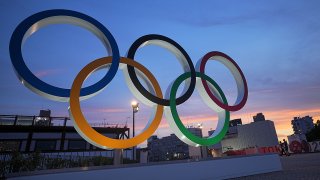Athletes competing in Tokyo need a whole lot of energy to perform, and often even more to train.
But what do they eat, and how much? What can we learn from people who hone their body to machine-like efficiency on the way to glory?
To satisfy our curiosity, we talked with Dr. Shawn Arent, a sports scientist at the University of South Carolina who has worked with pro franchises like the New Jersey Devils and Texas Rangers, and with Team USA soccer for 17 years.
Arent was a good sport answering some wacky questions while telling us a lot about exercise science.
Snacks at soccer halftime
Halftime is a great time for soccer players to fuel up before they run all across the field for another 45 minutes (and sometimes even longer in games with overtime).
So, the team puts out snacks in the locker room at halftime?
Tokyo Olympics
Watch all the action from the Tokyo Games Live on NBC
What It's Like Repping the U.S. Wheelchair Basketball Team For the 1st Time
“You would hope so. If they don’t they’re probably not a very good team. … There’s some really cool research showing that that halftime re-feed can really extend overall performance in the second half.”
Sometimes, it’s a struggle to get a player to eat if they may not feel hungry. But the fuel is necessary to replace what’s lost: soccer players can burn as many as 2,000 calories in a match, says Arent.
“In some cases we're simply trying to get like, for example, Gatorade or sports drink in them. That's got carbohydrates and electrolytes, and rehydrates them. Because the hydration aspect is going to be huge here. In that it helps with absorption as well as when you get dehydrated, things get harder and harder to absorb, so we want to avoid that.”
You may remember orange slices from your grade school soccer games, but granola bars, energy gels, water and even caffeine pills or energy drinks are some of the most common things you’ll see the pros consume.
“You're not talking about a buffet. We're not looking to lay out a series of Subway sandwiches or anything like that. We want stuff that they can get in quickly in that very short duration of halftime while they're getting coached up and ready to go.”
Outside the game, not always plain chicken and rice
“A lot of people might be surprised at how fairly not good some Olympians’ diets are,” says Arent. “It depends on what kind of nutritional guidance they get. And some of them are just so genetically gifted that they find ways to compensate,” Arent says.
“The key is to feed for the work necessary.”
There’s deception involved
“One thing to also realize too, is sometimes when you hear what an athlete’s diet is, they’re not always telling you the truth,” says Arent.
Wait, what? Like mind games, or the “Art of War” acted out through diet “tips”?
“If you’re an elite athlete and you want your competitors to suffer a little bit, make them think you’re doing something you’re not actually doing... and then they try to emulate and do the same thing, their performance goes to crap... I actually know a few that have done this.”
In the heat of competition, taste matters
Of course, there are always a few elite athletes who manage to outperform even when they appear to break the rules of healthy eating.
One example is former Olympian hockey player Jaromir Jagr, who is behind only Wayne Gretzky as the second all-time points scorer in the NHL, and who occasionally got roasted for his tendency to drink Diet Coke instead of water on the bench in games.
“We were around him when I was with the Devils, the dude is a beast,” says Arent. “It’s kind of like, you can have orange juice in your bottle for all I care, you’re killing it.”
Jagr did eventually switch away from Diet Coke. But Arent said he's not the only athlete to ever drink soda when competing.
“It's not as common anymore, but for quite a while, a lot of the European cycling teams actually would have flat Coke in their bottles rather than a sports drink,” says Arent. “It was palatable to them, especially if it was cold. And that's one of the things with these longer duration events — in some cases your appetite can really suffer.”
That matters a lot, especially in a long event. After a certain point, only drinking water can dilute your blood electrolytes.
“We want you to stay hydrated, but this is why there's a time and a place for carbohydrates and electrolytes, particularly sodium, to try to maintain these balances and allow you to function at a higher level, especially because what you're losing through sweat and breathing itself.”
Wait, but isn’t it bad to drink a lot of caffeine when you need water?
Well, not necessarily.
“You divert blood from your kidneys in the first place with these high intensity efforts, so any diuretic effects occur more after. And that's pretty easily solved by drinking a little bit of extra fluid. So we're not really that worried about that dieresis with caffeine or some of those.”


